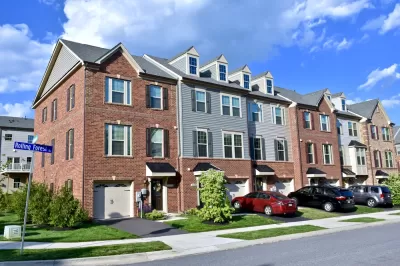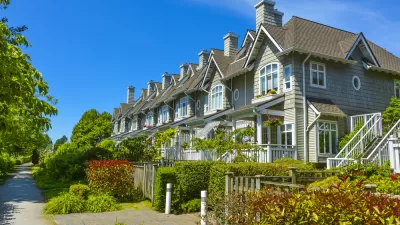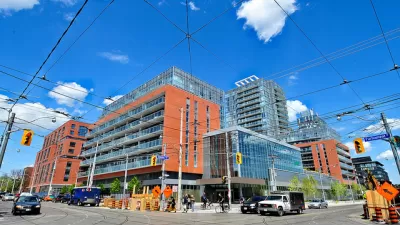How does one talk about density without frightening people? One term that's floating around is "gentle density," referring to the missing middle between mid-rise and detached homes.

Navigating the density debate might be easier if more cities embraced "gentle density," which Brent Toderian defines as "attached, ground-oriented housing that's more dense than a detached house, but with a similar scale and character. Think duplexes, semi-detached homes, rowhouses, or even stacked townhouses."
While even this mild form of densification draws opposition, it's less drastic than big blocky mid-rises. "Many people don't mind sharing a common wall and are eager to cut their costs and carbon footprint, but still appreciate a direct relationship with the ground. That's why fellow urbanist Daniel Parolek in San Francisco calls this kind of density the 'missing middle.'"
Rowhouses, townhouses and the like used to be an urban staple. But now, planners in many cities will have to relearn them. "In most cities though, deliberate zoning decisions have made this kind of housing illegal."
FULL STORY: Canadian cities need more 'gentle density' to address housing crunch

Alabama: Trump Terminates Settlements for Black Communities Harmed By Raw Sewage
Trump deemed the landmark civil rights agreement “illegal DEI and environmental justice policy.”

Planetizen Federal Action Tracker
A weekly monitor of how Trump’s orders and actions are impacting planners and planning in America.

Trump Administration Could Effectively End Housing Voucher Program
Federal officials are eyeing major cuts to the Section 8 program that helps millions of low-income households pay rent.

USDOT Threatens to Pull New York Highway Funding
The Trump administration wants the state to kill New York City’s congestion pricing program despite its demonstrated success.

LA’s Tree Emergency Goes Beyond Vandalism
After a vandal destroyed dozens of downtown LA trees, Mayor Karen Bass vowed to replace them. Days later, she slashed the city’s tree budget.

Sacramento Leads Nation With Bus-Mounted Bike Lane Enforcement Cameras
The city is the first to use its bus-mounted traffic enforcement system to cite drivers who park or drive in bike lanes.
Urban Design for Planners 1: Software Tools
This six-course series explores essential urban design concepts using open source software and equips planners with the tools they need to participate fully in the urban design process.
Planning for Universal Design
Learn the tools for implementing Universal Design in planning regulations.
Ada County Highway District
Clanton & Associates, Inc.
Jessamine County Fiscal Court
Institute for Housing and Urban Development Studies (IHS)
City of Grandview
Harvard GSD Executive Education
Toledo-Lucas County Plan Commissions
Salt Lake City
NYU Wagner Graduate School of Public Service





























